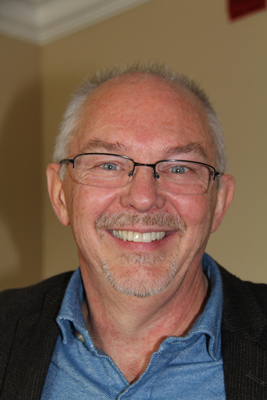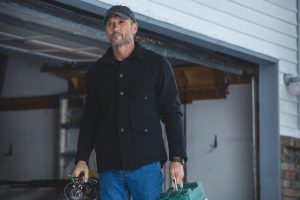By: Izumi Hasegawa March 10, 2017

I am always skeptical towards religious themed films, especially those aimed at preaching to the audience. So you can probably imagine my initial reaction when I entered the screening room for The Shack and within the first 20 minutes or so of the film, there was a church scene complete with a congregation sing hymn and a preacher leading a service.
However, I had a job to do so I took a deep breath and exhaled with an open mind and I was glad that I did, because what I quickly realized was The Shack was different from the other films that fed into my skepticism. This film is more about understanding, accepting and love, which is actually what I believe that guy named Jesus originally was trying to tell people about 1000 years ago.
Now, the complete irony here is that this film got my attention, and remember I am someone not keen on sitting through 120 minutes of theology for entertainment. So the storytelling style did what was intended – found a way to get the attention of someone like me and be able to get a message across. So I was shocked when I learned this book was denied by Christian publishers because they believed the way Author, William Paul Young told the story of God was “heresy”. This led to Young publishing the novel himself, and the rest as they say is history.
 Q: How did it come about that you self published this book?
Q: How did it come about that you self published this book?
We intended to publish, but 26 publishers turned it down. Half of them were Christian, faith-based people, and half of them were secular press and they had one issue in common, and that was, “What is this? What genre is it? Where are we going to put it?” Then we had (another) different issue. Faith-based people thought it was too edgy, and the secular people thought it had too much Jesus in it. I got caught between edgy and Jesus and you know what? I found out a whole bunch of people are in the same place.
I asked the question, because I didn’t know anything about publishing: “How hard is it to publish a book?” And two guys in California created a little publishing company to do it for $500, or whatever it costs to start a publishing company. We looked for a printer and one of the guys volunteered to ship books out of his house at night because he was putting in people’s sprinkler systems during the day.
 We set up a website and we pooled our resources. I had someone lending me money. One of the guys had some savings, and the other had a Visa and a MasterCard. We ordered 10,000, which we were told later is 8,000 in your garage when you run out of friends and family. They drop-shipped them in May of 2007 and we had no marketing, no promotion. It was okay.
We set up a website and we pooled our resources. I had someone lending me money. One of the guys had some savings, and the other had a Visa and a MasterCard. We ordered 10,000, which we were told later is 8,000 in your garage when you run out of friends and family. They drop-shipped them in May of 2007 and we had no marketing, no promotion. It was okay.
The original conversation started with about 15 copies that I made at Office Depot that these guys got a hold of. They then said they wanted to make a movie with a third gentleman, but the idea of printing/publishing said (to me) that’s (just) a step. If you get to 100,000 novels, and sell 100,000, Hollywood will come talk to you, because 65% of all successful Hollywood movies are book adaptations. We’re going, “Alright, we’ll go through 10,000 and make our way to 100,000,” not realizing that the average books sells between 3-5,000 copies in its entire existence and (if) you can sell 75,000 you have a best seller. I didn’t know that.
 We had 10,000 copies, actually 11. It’s called overage. They “accidentally” give you an extra 10% and charge you for it. (We were working) out of (the publisher’s) garage, two storage units and the local printer in the first 13 months. Because, 13 months later the two guys Brad and Wayne who own the publishing company, entered a joint venture with “The Shack” who took the book internationally and In those 13 months we spent a lot less than $300 in marketing and advertising. (We) shipped almost 1.1 million copies of “The Shack.” We’re brilliant. I’m just saying it’s totally a God thing, and we had no clue what we were doing. Then it took off.
We had 10,000 copies, actually 11. It’s called overage. They “accidentally” give you an extra 10% and charge you for it. (We were working) out of (the publisher’s) garage, two storage units and the local printer in the first 13 months. Because, 13 months later the two guys Brad and Wayne who own the publishing company, entered a joint venture with “The Shack” who took the book internationally and In those 13 months we spent a lot less than $300 in marketing and advertising. (We) shipped almost 1.1 million copies of “The Shack.” We’re brilliant. I’m just saying it’s totally a God thing, and we had no clue what we were doing. Then it took off.

Q: Did you have faith that a lot of people could relate to it?
When I wrote it, 15 copies did everything I wanted it to do. I never intended to be a published author. So I never wrote it with any intention that this would be something people would love. But my friends started giving it to their friends and I started getting emails from people I don’t know. They were not like, “Thanks for the book”. They were like, “Let me tell you a story. Let me tell you how these words have intercepted (a) great loss or great tragedy in my family.” Or, “This has totally changed the way that I think about God.” I’m going, “Really?” In fact, that’s why I contacted Wayne. I didn’t know what to do with these emails. I’m working three jobs. I’m doing shipping and receiving, cleaning toilets and a hotel night clerk, food processing, and web harvesting on the side, and we’re living in a tiny 900 square-foot house, and Kim (Young, wife) walks to a job at a high school bakery, and we have 6 children. So it’s like, “What is this?” That started this conversation?”
 Q: You’ve grown up with a very different life than the average American. I’m from Japan and my family runs a Shinto shrine. Christians have told me I’m going to hell for my faith, does that seem strange?
Q: You’ve grown up with a very different life than the average American. I’m from Japan and my family runs a Shinto shrine. Christians have told me I’m going to hell for my faith, does that seem strange?
I know, and I’m sorry. I grew up in a very religious Protestant evangelical history, and we had the same angry God that you’ve run into. That’s why Octavia (Spencer, plays Papa) is this large black African American, embracing, in-your-face woman. Because that’s the God that actually showed up and healed my heart, not the God I grew up with. I don’t believe that God is a religious being. I’m orthodox, in the sense that I love the trinity. I love that there is one God, but it’s a three person great dance of relationship, because that means (since) eternity, relationship and love have always existed. The God I grew up with, he was alone, and a God who is alone; love is not the nature of that God.
 My intention with that was a Gandalf with a bad attitude kind of God: White, distant, grandfatherly, and bearded (like) Zeus watching from the infinite distance (with) a disapproving heart. And that’s why Mackenzie (Phillips, played by Sam Worthington) goes into the shack the first time and tears it up. When he goes back, that’s because his God is the one that I grew up with, and I don’t think that God exists. I’m with you, and we bring our religions to the table. God is not a religious being; God then climbs into our religions to help us and destroy the impediment that keep us from loving and the authenticity of a relationship and all of (that). God doesn’t seem to be much of a respecter of religion. He’ll climb into anything in order to free us from the limitations that we bring to the table. Does that make sense?
My intention with that was a Gandalf with a bad attitude kind of God: White, distant, grandfatherly, and bearded (like) Zeus watching from the infinite distance (with) a disapproving heart. And that’s why Mackenzie (Phillips, played by Sam Worthington) goes into the shack the first time and tears it up. When he goes back, that’s because his God is the one that I grew up with, and I don’t think that God exists. I’m with you, and we bring our religions to the table. God is not a religious being; God then climbs into our religions to help us and destroy the impediment that keep us from loving and the authenticity of a relationship and all of (that). God doesn’t seem to be much of a respecter of religion. He’ll climb into anything in order to free us from the limitations that we bring to the table. Does that make sense?
 Q: What’s the reason behind your choices to have a very Native American spirituality?
Q: What’s the reason behind your choices to have a very Native American spirituality?
WY: Ah, especially with Graham Greene, (plays Male Papa). Well Sumire (Matsubara, plays Sarayu) is actually Japanese. I have a lot more residence with First Nation’s people. I grew up in a tribe; I grew up in an island tribe in New Guinea. So I was in there, and that was my world. When I was 5 and Wycilffe (bible translators) translators came in to translate the language, I was the informant. (New Guinean) was my first dreaming language. I always connected to the Earth in that sense and I find a lot of resonance in terms of some of the themes in “Crossroads”; for example, the Holy Spirit is a Lakota Sioux (Tribe) grandmother.
When I wrote “Crossroads,” a friend of mine was Lakota Sioux, and he took it to their elders to vet the character and they did. It’s beautiful. Again, I think the only time you find God in a box is because God wants to be where we are, right? God is not about boxes, we’re about boxes. We’re all about the vision and separation. We can walk into any conversation with any person on this planet and learn something. We need to step into the holy ground with other people’s stories, because then maybe we cannot keep dividing the planet into more and more boxes. It’s going to take some work, and it’s going to take some work in our own parts, which I think is what the movie does. It invites you into a place where you might get confronted about unforgiveness, bitterness, or judgementalism, but you might be affirmed that your tears matter. You’re not alone and your questions are important, and I think the movie does a fantastic job of creating the space for that invitation.
 Q: So now, you are a well paid Hollywood writer
Q: So now, you are a well paid Hollywood writer
I did not get a dime from the movie. I laid it down and gave it away. I have no agenda in that. It’s the most beautiful thing and place to be for me. You would make assumptions like that, but you don’t understand. Inside the grace of the day, it became time, I laid it down. I laid down all creative control, I laid down the rights, and I gave them to the gentleman who started the publishing company and entered into the relationship with Lionsgate and Gil Netter (producer). I’m in the middle of this without any dog in the fight. I have absolutely no regrets about that; I’m thrilled to be in this place.
Q: Did you go to the set at all?
Oh yes, because I laid (the creative rights) down, but they didn’t need to invite me to anything. They just embraced and invited me into it. It was all a grace gift. I got to look at the script, I got to give my input, I got to talk about the actors, I got to be on the set, and I got a cameo.
 Q: I understand you make a cameo appearance in the film, where does that happen?
Q: I understand you make a cameo appearance in the film, where does that happen?
Lionsgate calls me up and says, “Would you consider coming up for the first day shoot, and would you consider praying a blessing over the entire cast and crew?” How cool is that? I’ve never been on a set of a major motion picture so, yeah. I go up there and have this beautiful day and at the end of the day Gil says (to me), “Hey Paul, you want to be in a cameo?” (I said), “Like in the movie?” He says, “Yeah, I’ve never shot a movie where the author was alive and I didn’t put the author in it.” I said, “Sure what do I have to do?” He said, “All you have to do is walk through this scene. We’ll just have this scene and you have to walk through.”
I’ve walked most of my life, how hard can that be? I’ve never had to think about walking. Once you start thinking about it, it’s like, “Oh my gosh, how do you do this?” It only took five takes. It’s in the scene where Willy, Tim McGraw is talking to Mackenzie. Willy brings a dog, he’s got a dog on a leash and he comes over and starts with, “Summer’s last hurrah,” because they’re packing the kids up to go to (out). They start this dialogue, and partway through that dialogue, you see this white, balding, kind of overweight guy just walk through the scene and I’m there.
Then I got to look at the cuts and give my notes, and all of that. I was involved a lot. I wasn’t expecting to be involved at all, so I’m so thankful for that.
The Shack opens in theatres March 3rd. For ticket information and theatre locations, visit the film’s official website at, http://www.theshack.movie/
Interview by Izumi Hasegawa – @HNW_Izumi
Edited by: Jody Taylor – @RealJodyTaylor
Follow Us: What’s Up Hollywood at @WhatsUpHWood
